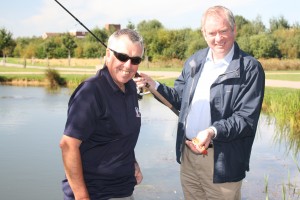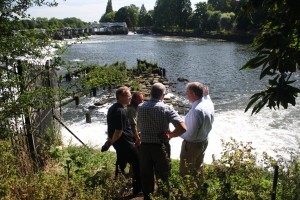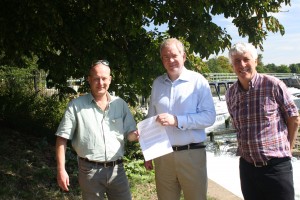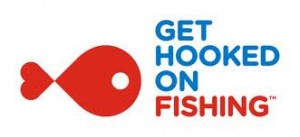-
- Buy a UK rod licence: EA Link
- 0800 807060 EA Hotline, Pollution, Poaching
- Thames Region River Levels
- Thames River Conditions
- Thames Temps and Clarity
- Thames Fishing Byelaws
- Thames Annual Tidefest
- Thames Record List
- Thames Eel Monitoring
- EA Annual Fisheries Report
- EA Flood Warnings
- Thames Sewage Discharge Notifications
- Thames Sewage Events
- Thames Tideway Tunnel
- River Thames Scheme: Reducing flood risk from Datchet to Teddington
- Martin Salter: Fighting for Fishing Blog
- Duncan Charmans World of Angling Blog
- Angling Trust
- Water and sewerage companies in England: environmental performance report 2013 – 2016
- EA Pollution incidents: 2014 evidence summary
- EA Pollution incidents: 2015 evidence summary
- River Crane and DNR Fisheries Impact assessment
- Links
Recent Tweets
Error retrieving tweetsNews Archive
Severn Trent Water fined £25000 for polluting the Elmbridge Brook
The charge was brought by the Environment Agency under Regulation 38(1)(a) and Regulation 12(1) of the Environmental Permitting Regulations 2010. During February 2011, a report was made to the Environment Agency about a dark black liquid in the Elmbridge Brook below Fairfield.
The report suggested that a sewer was overflowing. Discharges of sewage to watercourses are controlled by Environmental Permits which require the sewage to be treated to certain standards to limit the polluting effect. The sewer system in question contained untreated ‘leachate’ from a nearby landfill site. Leachate is very contaminated water that percolates through landfill wastes, and must be disposed of correctly.
The landfill had a consent with Severn Trent Water Ltd to discharge their leachate to the sewer system. Environment Agency Officers attended site and discovered an overflowing sewer manhole. The blockage had been caused by a large tree root of about 8 feet in length that had grown in through the sidewall. Severn Trent Water Ltd response crews arrived on site shortly afterwards, and took samples.
The blockage was cleared and the sewer returned to normal operation on 12 February. Environment Agency ecological tests found dead invertebrates in the watercourse 800 metres downstream of the source of the pollution. Chemical tests also showed very high levels of ammoniacal nitrogen up to 4 kilometres downstream, which is potentially toxic to aquatic life. On 15 July 2011, a Severn Trent Water Ltd representative attended an interview under caution.
A statement was read out which said that they had taken swift action to remedy the problem, and to minimise the environmental impact. They also confirmed that inspections of the sewer system in the area would now be carried out on a 6 monthly basis.
Posted in News
Tagged Environment Agency, Pollution, Severn Trent, Sewage
Comments Off on Severn Trent Water fined £25000 for polluting the Elmbridge Brook
Environment Agency wages war on Hampshire poachers
 The Environment Agency has announced a major crackdown on poaching across all of Hampshire’s rivers, streams and estuaries following a recent increase in fish theft and illegal angling.
The Environment Agency has announced a major crackdown on poaching across all of Hampshire’s rivers, streams and estuaries following a recent increase in fish theft and illegal angling.
From the 1st October, specialist Environment Agency fisheries enforcement officers will be carrying out increased patrols and surveillance at known poaching hotspots to target individuals involved in illegal angling activities.
Over the coming weeks specialist officers will also be stepping up their day and night patrols along the coast to clamp down on illegal fishing. Sadly, over the past few months the Environment Agency has received numerous reports of illegal fishing together with evidence showing an increase in poaching. Recent enforcement activity has included the seizing of illegal fishing equipment, including a spear gun and a ‘snatch’. A snatch is a weighted treble-hook which is used to deliberately ‘foul hook’ or impale fish.
Tim Sykes of the Environment Agency said: “Recently we have received increasing reports from responsible anglers of unscrupulous individuals using illegal and dangerous equipment to catch fish. These methods have the potential to harm wildlife, seriously damage fish stocks and our natural heritage, and ruin the sport for future generations. “The Environment Agency is committed to eliminating illegal fishing. We urge anglers and members of the public to report any suspicious nets, traps or set-lines they come across, or if they see someone shining a light into a river at night. We take illegal fishing very seriously indeed and will look to prosecute perpetrators to the fullest extent of the law. “Our fisheries officers regularly patrol rivers, streams, lakes & coastal waters to ensure that fishing is carried out in a safe and legal way. Due to the recent reported increase in cases of illegal fishing, more patrols will be carried out both during the day and night to catch anyone who flouts the law. Those caught as a result of this crackdown can expect to face a fine of up to £50,000.”
It is not just poachers who could end up paying a hefty fine as retail outlets need to be aware of the regulations too. It is illegal to sell rod-caught salmon and sea trout as the fish must be sourced from legitimate fisheries, and buyers should check that all fish have an Environment Agency tag attached. Any outlet convicted of handling fish in suspicious circumstances faces a fine of up to £5,000.
Legitimate salmon anglers on the rivers Test and Itchen are a great help in keeping a watchful eye on our rivers and by voluntarily returning all rod-caught fish to the river so that they can continue with their spawning migration. A large female salmon may carry up to 10,000 eggs, so if these fish are illegally removed it can have a major impact on future fish stocks in our local rivers.
Newly created paths or flattened vegetation along the banks can often be a sign that illegal fishing has taken place. Illegal set-lines and nets can often be tied to low hanging branches near the waterline.
If anglers or members of the public do come across these illegally set instruments they should leave them in place and report the location immediately. If anyone thinks that they have seen any illegal fishing, they should phone the Environment Agency’s 24-hour incident hotline on 0800 807060 or call Crimestoppers anonymously on 0800 555111 with information on environmental crime. National and Regional byelaws can be found on the Environment Agency’s website: www.environment-agency.gov.uk/fish
Posted in News
Tagged Chalkstream, Environment Agency, Poaching
Comments Off on Environment Agency wages war on Hampshire poachers
Salmon and Trout Association Submits Complaint against UK to the European Commission
 Complaint by Salmon & Trout Association highlights lack of delivery and years of prevarication in failure to comply with the Habitats Directive on River Avon SAC The Salmon & Trout Association (S&TA) has today (27th September) submitted to the European Commission a formal legal complaint against the United Kingdom for its failure to protect English chalkstreams, particularly the Hampshire Avon, as it is required to do under the EU Habitats Directive.
Complaint by Salmon & Trout Association highlights lack of delivery and years of prevarication in failure to comply with the Habitats Directive on River Avon SAC The Salmon & Trout Association (S&TA) has today (27th September) submitted to the European Commission a formal legal complaint against the United Kingdom for its failure to protect English chalkstreams, particularly the Hampshire Avon, as it is required to do under the EU Habitats Directive.
As the UK hosts almost all the chalkstreams of Europe, it has a particular responsibility to ensure their protection and conservation. However, of 161 chalk rivers and streams across England, only four have been designated under the Habitats Directive – the Hampshire Avon, Itchen, Wensum and Lambourn. The condition of these four rivers is poor and they are not currently meeting the various targets and objectives laid down in the Habitats Directive.
Taking the Hampshire Avon SAC as a case study, and basis for the Complaint, the S&TA has examined the various plans, strategies and reports going back to the formation of the National Rivers Authority (ie the NRA Catchment Management Plan, the various Salmon Action Plans, the Local Environment Agency Plans, the Catchment Abstraction Management Strategy (CAMS), culminating in the Review of Consents process undertaken by the Environment Agency to examine whether activities that it consents or permits on the river – such as abstraction and effluent discharges – are or could be having an impact on the River Avon SAC and the species for which it is designated, including Atlantic salmon.
Specifically, the Complaint shows that the UK has failed:
-
to comply with Articles 2 and 6 of the Habitats Directive and is highly likely to fail to comply with Article 4(1)(c) of the Water Framework Directive in respect of the River Avon;
-
to apply a sufficiently precautionary approach to the protection of the River Avon SAC, contrary to the requirements of Article 191 of the Treaty on the Functioning of the European Union, erring instead on the side of supporting the status quo and avoiding as far as possible the need to amend, revoke or vary existing consents and permissions on the River Avon SAC;
-
to establish the necessary conservation measures, appropriate management plans and appropriate statutory, administrative or contractual measures to protect the natural habitat types and species of the River Avon SAC, relating to the impacts caused by low-flows, over-abstraction of water, including for public water supply and nutrient and other pollution.
-
to avoid the deterioration of natural habitats and species on the Hampshire Avon since its designation under the Habitats Directive.
In particular, the evidence on that iconic species, the Atlantic salmon, for which the Hampshire Avon SAC is designated, shows that the UK has patently failed to take the steps it is required by law to do. As a result the Avon salmon population is under severe threat and has consistently failed to meet conservation limits set for its long-term viability.
Paul Knight, S&TA CEO, declares: “We have been forced to take this action by the failure of ambition and delivery on the part of the UK Government and its agencies. The prospects for chalkstream habitats are ‘bad and deteriorating’. Their long-term viability is far from assured. Yet the UK has failed to get to grips with over-abstraction, reduced flows, nutrient inputs and a range of other issues which combine to cause ‘chalkstream malaise”. He continues, “The condition of the salmon population of the Hampshire Avon is very poor and is deteriorating – it is a shadow of its 1980s levels. The UK Government and its agencies understand why this is happening, but they have singularly failed adequately to address the root causes – low flows, over-abstraction, nutrient pollution, siltation. “The Hampshire Avon is an SAC, part of the European network of the most valuable and protected nature conservation sites in Europe. If the UK Government isn’t prepared to show the necessary political will and ambition to protect nature here, one is left to wonder where it will.”
Guy Linley-Adams, Solicitor to the S&TA, who drew up the legal complaint, points out, “The UK negotiated and then signed up to the Habitats Directive and the high level of protection for our very best nature conservation sites and key species that it requires. Delivery of that high level of protection is not optional, it is required by law. It is regrettable that the S&TA has to appeal to the European Commission for help in ensuring that the Hampshire Avon and its salmon are protected for future generations.”
Teresa Dent, Chief Executive of the Game and Wildlife Conservation Trust (GWCT), says: “GWCT supports the complaint made by the Salmon and Trout Association relating to the condition of the Hampshire Avon SAC, which is substantiated by the available evidence. The condition of our chalk rivers, and much of the wildlife that depends upon them, has been a matter of serious concern for many years under successive governments. “It is vital that Government acts effectively and promptly on the best scientific evidence and advice to remedy the situation. We urge this Government to take the welcome opportunity provided by its draft Water Bill to address the question of over-abstraction. We have successfully researched over many years how to manage such rivers effectively, but our prescriptions and the ecosystem rely on a predictable water flow. She concludes: “GWCT is strongly in favour of practical solutions, working wherever possible in partnership with interested parties, including farmers and developers. Specifically, we suggest that agri-environment schemes be targeted to help protect the habitat of chalk streams and rivers and that all viable measures be taken to reduce the consumption of water whether domestic, industrial, horticultural or agricultural.”
The UK Government recently published a Water White Paper and has even more recently published a draft Water Bill which presents an opportunity to deal with many of the criticisms raised in the S&TA’s complaint, particularly those in relation to over-abstraction and restoring sustainable abstraction on English rivers.
By taking this unprecedented action, the S&TA hopes to compel the UK Government to take the measures necessary to deal with these problems, not only on the River Avon SAC or indeed just on the four chalkstream SACs (all of which suffer from broadly similar problems to the River Avon), but those being suffered by many English and Welsh rivers across the board.
Posted in News
Tagged Chalkstream, Environment Agency, EU, Salmon, WFD
Comments Off on Salmon and Trout Association Submits Complaint against UK to the European Commission
Fishery Owners fined for keeping Invasive Species
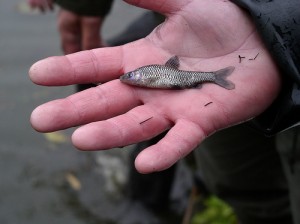 The owners of a Devon fishery have been ordered to pay nearly £35,000 in fines and costs for keeping two invasive species of fish in lakes near Holsworthy. The case is the first of its kind in the region.
The owners of a Devon fishery have been ordered to pay nearly £35,000 in fines and costs for keeping two invasive species of fish in lakes near Holsworthy. The case is the first of its kind in the region.
Topmouth Gudgeon – Pic  Environment Agency
Environment Agency
Non-native fish pose major risks to our native fish and other wildlife. They can out-compete them for food and habitat, change the habitats they live in, spread disease and parasites and even eat our native fish. Keeping such fish without a licence is an offence under the Import of Live Fish (England and Wales) Act 1980.
When licences are granted, they are subject to strict conditions. Checks at Clawford Fishery revealed the presence of two potentially invasive species; topmouth gudgeon and wels catfish, in several of the 17 lakes at the site. The lakes flow into the River Claw, connected to the River Tamar and the presence of these highly invasive fish posed a direct risk to the rivers valuable Salmon populations.
Although only 3 – 4 inches long, the topmouth gudgeon, is one of the higest risk non-native species in Europe and consequently is not permitted in any waters. Wels catfish is Europe’s largest freshwater fish and can be a voracious predator. In fully-enclosed stillwaters, licences for keeping wels catfish may be issued, but in open sites connected to rivers, like Clawford, it poses a serious risk to other fish populations and cannot be kept.
Matt Brazier of the Environment Agency said: ‘Invasive non-native fish pose serious risks to our native species and habitats and are incredibly costly to the angling industry and the vital recreation and employment opportunities it provides. The Environment Agency is working hard with fishery owners and the fishing industry to prevent their spread and where high risk invasive fish are stocked illegally we will take appropriate action to ensure they are contained and removed,’ said Matt Brazier, for the Environment Agency.
The Environment Agency are working hard with fishery owners and the fishing industry to prevent their spread and where high risk invasive fish are stocked illegally we will take appropriate action to ensure they are contained and removed Earlier this year we launched a large scale operation to contain and remove topmouth gudgeon and wels catfish from Clawford Fishery. During the operation native fish stocks were rescued and held in quarantine while an organic ‘piscicide’ was applied to eradicate the invasive fish. The piscicide is designed to only remove fish and is not harmful to other wildlife.
Once it had broken down, the native fish were returned and angling resumed at the site. The fish removal and clean up operation at Clawford cost around £170,000 and lasted several weeks. We will continue to monitor the site, but early indications are that the operation has been successful.
John and Wanda Ray, Clawford Fishery, Holsworthy, Devon, were today (Sep 20) fined a total of £4,950 and ordered to pay £30,000 costs by Barnstaple magistrates after pleading guilty to five offences under the Import of Live Fish (England and Wales) Act 1980.
Posted in News
Tagged Environment Agency, Fish, Invasive
Comments Off on Fishery Owners fined for keeping Invasive Species
Support shown for Thames Tunnel at the Mayors Festival
Campaigners from Thames Tunnel Now were out in force promoting their message to visitors to the Thames Festival held on the embankment outside City Hall.
They received a warm reception from Londoners who want an end to the scandal which sees a staggering 39 million tonnes of untreated sewage entering the Thames every year as London’s Victorian sewers struggle to cope with the demands of a city with 8 million people.
Campaigners from the London Wildlife Trust, Thames Anglers Conservancy, Thames21 and the Angling Trust staffed the TTN stall on both days of the festival weekend (8th & 9thSeptember) handing out leaflets and collecting signatures in support of the Tideway Tunnel.
Thames Water had approximately 800 visitors stop by the Tideway Tunnel stand to meet staff members, check out models of how the tunnel will be built and watch films explaining the issue of untreated sewage flowing into the River Thames. There was also a pledge board where scores of visitors signed to show their support for plans to clean up London’s river.
Debbie Leach, Chief Executive of Thames21 said: “The Festival was a wonderful weekend in celebration of the river and it was fantastic to see everyone not just enjoying the Thames, but wanting to talk about the challenges it faces. I was really struck by the overwhelming level of support for the Thames Tunnel project and people recognising that sewage in the river must be dealt with effectively, decisively and without further delay.”
Richard Crimp of Thames Anglers Conservancy added: “The Tideway Tunnel simply has to happen as soon as possible, the current ecological status of the river is an environmental disaster that needs to be rectified, to do otherwise is grossly irresponsible and short sighted. Millions of tonnes of untreated sewage spew into the river every year and it has to stop.”
Chief Executive of London Wildlife Trust, Carlo Laurenzi said: ‘It was a delight to see so many people who love the Thames and its wildlife at the weekend. The Thames Tunnel will greatly improve the health of the river for a wide range of wildlife from European eel, flounder and smelt, to grey heron and even grey seal.’
Posted in News
Tagged Pollution, Sewage, Super Sewer, TAC, Thames Water, Tideway Tunnel
Comments Off on Support shown for Thames Tunnel at the Mayors Festival
Thames Hydropower and Invasive Species on the agenda as MP meets Angling Groups
Last week, as well as welcoming the re-appointment of Richard Benyon as Fisheries Minister, the Angling Trust reached out across the political divide and organised a briefing for the new Minister for the Environment, Food and Rural Affairs Tom Harris. Martin Salter, Dr Alan Butterworth and Mark Owen from the Trust were joined by colleagues from Thames Anglers Conservancy (TAC) and Get Hooked on Fishing (GHoF) when they took Tom to visit a West London angling participation scheme in Ealing and then on to Teddington weir to hear angler's concerns about the implementation of damaging hydropower schemes and problems with predation and invasive species.
Tom Harris catching a golden rudd with Keith Arthur Under the expert guidance of Sky TV's Tight Lines presenter Keith Arthur
Tom was able to catch his first fish since childhood days at Northala Fields. Tom Harris and Sarah Collins of GHoF at Northala Fields Sarah Collins, new CEO of Get Hooked on Fishing said: "Get Hooked on Fishing was delighted to show Tom the potential social and community benefits of angling and how it can be successfully used as a tool to engage or re-engage the hard-to-reach. At GHoF Ealing we will be offering angling as a cradle-to-grave positive activity for all. We were able to explain to Tom how, through our partnership with Ealing Borough Council and other organisations, we are planning to provide volunteering, qualification, coaching, apprenticeship and future employment opportunities for children, young people, their families and local communities."
Angling Trust's Dr Alan Butterworth, Dave Harvey and Richard Crimp (TAC) brief Tom Harris on the problems of hydropower in lowland rivers
Speaking with Tom at Teddington weir, Angling Trust rivers expert Dr Alan Butterworth said: "Hydropower schemes on our lowland rivers will never produce a significant amount of electricity yet will cause great harm to the aquatic environment, especially to fish populations, whilst attracting unsustainable high subsidies paid for by all consumers."
Dave Harvey, Chairman of TAC added: "We were pleased to get the opportunity to take Tom to the historic weir pool at Teddington and explain our grave fears over the future. We explained that few people look below the water and consider what long-term ecological damage may be caused for a tiny amount of electricity. The Environment Agency had promised long-term monitoring of the scheme at Romney Weir, but it is still to be commissioned some 10 years on from concept. They now are ploughing ahead with multiple schemes with unknown consequences bar profits for the developers and revenue for the EA themselves."
Later on in the visit, Martin Salter and Mark Owen briefed Tom Harris on invasive non-native species and in particular the annual cost to the economy and the need for the government to take action to limit the spread of invasive species via ship's ballast.
Angling Trust Freshwater and Environment campaign manager Mark Owen said: "Latest estimates show a staggering £1.3bn cost to England alone due to the rising costs to fisheries of signal crayfish, Canadian pond weed, mitten crabs and other species. The Angling Trust, have asked Tom Harris to press the government to urgently ratify the International Convention to control ship's ballast water to stop more coming in and to tighten our legislation so that we have the proper powers to control and eradicate these threats to our waters. We are also hopeful that Tom will give his backing to our 'Action on Cormorant campaign to protect our fish stocks from unsustainable predation."
Tom Harris MP said: "The Angling Trust organised an enjoyable and highly informative visit for me. Britain is a nation of anglers and Labour remains committed to making sure that the sport flourishes. Angling is one of the few sports that can be enjoyed by all ages and by people of all abilities. Anglers have a keen interest in, and a concern for, our natural environment and ministers can only benefit from listening to anglers' views and benefiting from their experiences."
Posted in News
Tagged Angling Trust, Fishing, Hydropower, Invasive, Martin Salter, TAC, Thames, Tideway Tunnel
Comments Off on Thames Hydropower and Invasive Species on the agenda as MP meets Angling Groups
Raw sewage floods Dollis Brook in Finchley after Thames Water pump failure
Raw sewage flooded a river full of wildlife in Finchley when a nearby pump failed and overflowed on Saturday. Neighbours woke to an “horrendous” stench after faeces spilled over into Dollis Brook, in Gordon Road.
Full story
Posted in News
Tagged Environment Agency, Pollution, Sewage, Thames Water
Comments Off on Raw sewage floods Dollis Brook in Finchley after Thames Water pump failure
Monthly Water Report shows Historic Recovery after the Drought
 The latest Water Situation report from the EA shows elevated river flows and groundwater levels for the time of year were common this month as the persistently wet weather of June and July subsided into more typical conditions for August.
The latest Water Situation report from the EA shows elevated river flows and groundwater levels for the time of year were common this month as the persistently wet weather of June and July subsided into more typical conditions for August.
Rainfall
Rainfall in August was 84% of long term average for South East Region, contrasting with the wet conditions in June and July. The rainfall this month was generally convective in nature with some heavy downpours. As a result rainfall distribution was very uneven within catchments, for example on the 13 th at Basingstoke in the Loddon catchment the highest daily total of 27mm was recorded, while a few miles away in Camberley less than 2mm was measured. Regional rainfall patterns also varied widely with the Cotswolds, Upper Thames, Cherwell, Thame and Berkshire Downs receiving above average rainfall for the month, whilst areas to the South and East had for the most part below average rainfall. The extremely wet conditions since April mean that total rainfall for April to August is the highest for the South East during summer months in the past 102 years.
Soil Moisture Deficit
Recharge and Groundwater Levels Soil moisture deficits are generally lower than average for the time of year, particularly in the Thames catchment. This is due to the wet weather in past months. Recharge during the summer is usually minimal and only has the effect of slowing declining groundwater levels. This year the unprecedented rainfall has caused recharge on a scale more typical of winter conditions for many areas. Groundwater levels are within their normal range at 7 of the 16 key monitoring sites. Stonor Manor in the Chilterns near Henley-on-Thames is the only remaining monitoring point with below normal levels for the time of year, and levels here are still rising. Many of the key monitoring locations have notably or exceptionally high levels for the end of August, and levels are at the highest they have been for at least 12 months in many areas, when usually levels would be nearing their lowest point. Levels, though unusual for August, are still well below the maximum annual levels at the key sites which generally occur between December and March.
River Flows
River flows decreased this month with the lower rainfall, with only small rises in flows due to the thundery showers, however flows were still the highest on record for August at Allbrook and Highbridge gauging stations on the Itchen. The Coln at Bibury in the Cotswolds and the River Thames at Eynsham were both the second highest on record after August 2007. Flows were above average for the time of year for all but 5 of the key sites. The Great Stour at Horton was the only key site with below normal flows – the 11 th lowest on record for August. Five flood alerts were issued during the month for the Rivers Cole and Ray – rapidly responding urban tributaries of the Upper Thames.
Reservoir Storage/Water Resource Zone Stocks
Reservoir storage remains above average in South East England, and is higher than at the same time last year.
Full report from the Environment Agency is available here
Posted in News
Tagged Drought, Environment Agency, Flood, Water Report
Comments Off on Monthly Water Report shows Historic Recovery after the Drought
Angling Trust welcomes Benyon back but reminds new Environment Secretary of pre-election promises
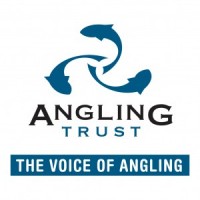 Following the Government's reshuffle earlier this week the Angling Trust has welcomed the re-appointment of Richard Benyon as Fisheries Minister but reminded his boss Owen Paterson, the new Secretary of State for Environment, of his pledge to limit commercial over fishing in favour of recreational sea angling.
Following the Government's reshuffle earlier this week the Angling Trust has welcomed the re-appointment of Richard Benyon as Fisheries Minister but reminded his boss Owen Paterson, the new Secretary of State for Environment, of his pledge to limit commercial over fishing in favour of recreational sea angling.
In 2005, during his time as shadow fisheries minister, Mr Paterson launched a Conservative Party policy document promising to take "full account of the needs of recreational sea fishing, limiting commercial activity if necessary to ensure that those needs are met". The Conservative Party said at the time that if it wins the General Election it will "create a stable and equitable framework for the fishing and allied industries, including the recreational fishing sector and tourism".
Chairman of the Angling Trust, Mike Heylin, said: "The Angling Trust will expect the new Environment Secretary to keep his pre-election promises and give our hard pressed recreational sector a better deal with more of the inshore fishery managed sustainably in the interests of both the environment and responsible sea anglers. Our estuaries and nursery areas in particular need better protection and our bass and other fish stocks must be allowed to breed successfully before being targeted for harvesting. We are proud of our good relations with politicians of all parties but fully intend to hold those in power to account."
The Angling Trust was also pleased to learn that Richard Benyon would be staying at Defra in his role as Parliamentary Under Secretary of State for Natural Environment and Fisheries.
The Trust's National campaign Coordinator Martin Salter said: "At a critical time for our sport with big issues like cormorant predation, marine conservation zones, the Severn Barrage and invasive species on the top of our agenda the last thing angling needed was a new fisheries minister who probably wouldn't have known cod from codswallop. Richard Benyon's understanding of angling, fisheries and rural affairs means he was the best placed minister to continue in his role and we look forward to working even more closely with him in future to ensure that the interests of anglers are represented at the highest level."
This view was echoed by the UK tackle trade.
Naidre Werner, Angling Trades Association Chair added: "I'm sure that members of the angling trade will be delighted to hear that Mr Benyon remains in post. Mr Benyon has been a strong supporter of angling participation initiatives, particularly National Fishing Month, and to be able to continue working with someone who understands the importance of recreational fishing and its value to the economy will only benefit everyone involved."
Posted in News
Tagged Angling Trust, Fish, Fishing, Martin Salter, WFD
Comments Off on Angling Trust welcomes Benyon back but reminds new Environment Secretary of pre-election promises



